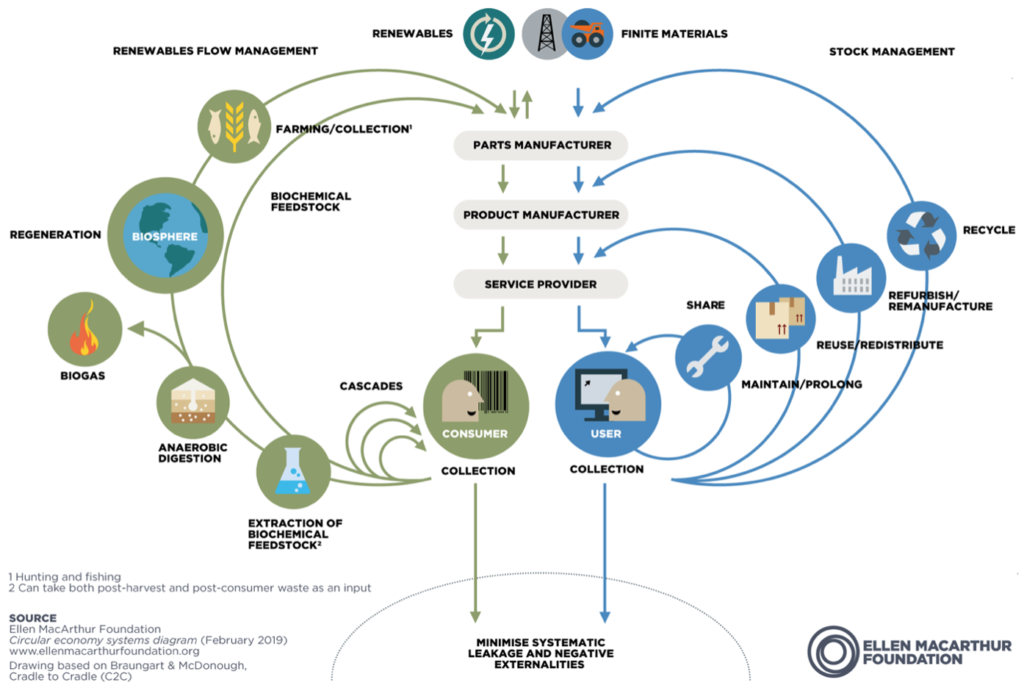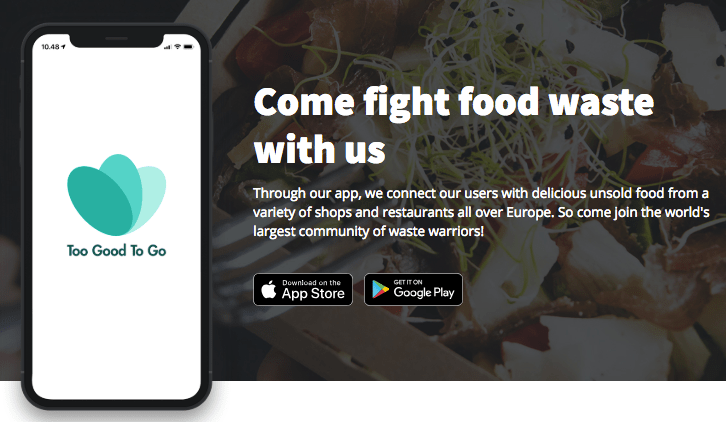A circular economy focuses on reducing and eliminating the creation of waste through a process of continuous use and regeneration of products, resources, and natural environments. A variety of sectors and goods within the economy that can build investments and enhance human and social capital can be applied to the circular economy. Overall, circular economies can benefit communities, businesses, and the environment. To fully comprehend this concept, the meaning of economy must be understood as it essentially controls what and how products are produced through streams of energy, materials, and information (ex. money).

https://www.ellenmacarthurfoundation.org/explore/the-circular-economy-in-detail
A circular economy emphasizes individuals focusing on regeneration, reuse, recycling, and longevity. The Platform for Accelerating the Circular Economy (PACE) has multiple global projects with affiliated PACE collaborators aimed at circularizing different areas like electronics, plastics, food, and textiles. ‘Denmark against Food Waste’ is one such project with ONE\THIRD as its leading independent organization falling under the Danish Ministry of Environment and Food. ONE\THIRD is a think tank highlighting how approximately one-third of food worldwide is wasted each year. This wasted food could feed approximately two billion people, and the United Nations (UN) had emphasized how global food waste must be halved by 2030 (onethird.dk). This is imperative as millions of people still suffer from hunger and worldwide food security has yet to be achieved.
Minimizing food waste, and preventing food from being wasted in the first place, has a large standing in circular economies. Reducing food waste/loss can benefit the economy by decreasing financial losses and increasing economic gains. The short-term goals of the ‘Denmark against Food Waste’ initiative are to bring together Danish food producers and retailers with the aim of cutting food waste in half by 2030. The long-term goal of this initiative is to emphasize collaboration between sectors. If this is achieved, food systems can be integrated and transitioned into the circular economy model successfully minimizing food waste. If a third of food is wasted every year, Denmark creates ~700,000 tons of food waste and the resources used to make this food are also being squandered like agricultural land, labor, and water. Globally, food waste contributes to 3.3 billion tons of CO2 equivalence of greenhouse gases and a loss of ~940 billion USD annually (pace circular.org).
Decreasing food loss promotes a circular food chain. ‘Denmark against Food Waste’ is an optional agreement that links over twenty-five food producers and retailers with the goal of halving food loss/waste by 2030. ONE\THIRD scouts for partners in Denmark to sign this voluntary agreement, and food waste is then measured and monitored with production of annual progress reports. ONE\THIRD initiates opportunities to create similar models in other sectors and regions. Some of the partners involved in ‘Denmark against Food Waste’ include large companies like Aldi, Carlsberg, and McDonald’s, and smaller, more local, companies like Hørkram, Meyers Madhus, and Dansk Erhverv. Denmark also has several apps like ‘YourLocal’ which connects stores with consumers to purchase food that is close to the expiration date for a lesser price to minimize food waste. Another app, ‘Too Good To Go,’ people with restaurants, bakeries, and stores that have a surplus of food. Achieving a sustainable food system means to evade exhausting natural resources and restore a balance for humans and the environment to co-exist. Food waste must therefore be prevented and integrated into a circular economy to achieve this balance.

Too many times good food is thrown out! Reduction of food waste and employment of a circular economy emphasizes that changes must occur all along the food supply chain from the field to the shelf. All points must become optimized to not squander other valuable resources like water, to maximize economic output, and to improve and expand food security.
____________________________________________________________________________________________
References:
https://www.ellenmacarthurfoundation.org/circular-economy/concept
https://pacecircular.org/denmark-against-food-waste
____________________________________________________________________________________________
Time To Act: The Circular Economy Action Agenda
Speakers:
- Inger Andersen, Executive Director, UN Environment Programme
- Frans van Houten, CEO, Philips
- Stientje van Veldhoven, Minister for the Environment and Housing, the Netherlands
- Jyrki Katainen, President, Sitra
- Dame Ellen MacArthur, Founder, Ellen MacArthur Foundation
- Carolina Schmidt, Minister for the Environment, Chile
- Peter Lacy, Chief Responsibility Officer and Global Sustainability Services Lead, Accenture
- Dominic Waughray, Managing Director, Centre for Global Public Goods, World Economic Forum
- Lisa Jackson, Vice President for Environment, Policy and Social Initiatives, Apple
- Naoko Ishii, Director, Center for Global Commons, University of Tokyo
- Andrew Steer, President and CEO, WRI
- David McGinty, Global Director, PACE
